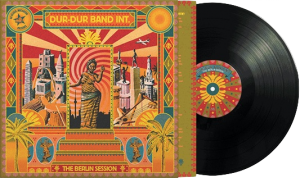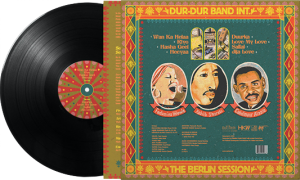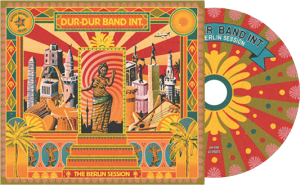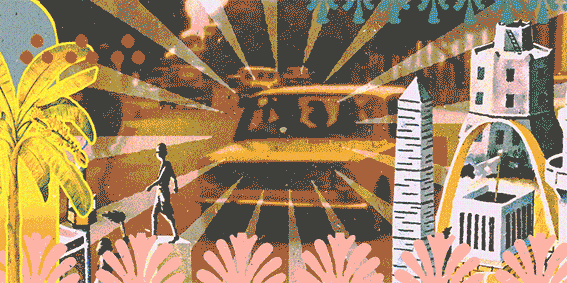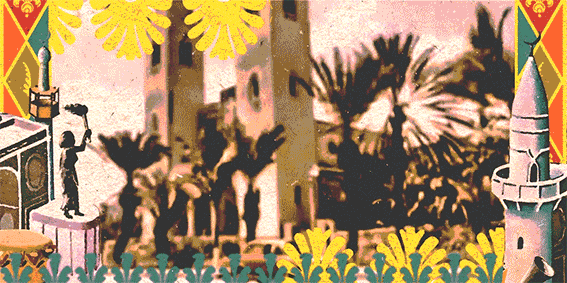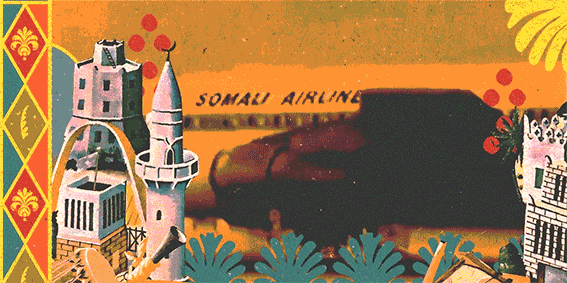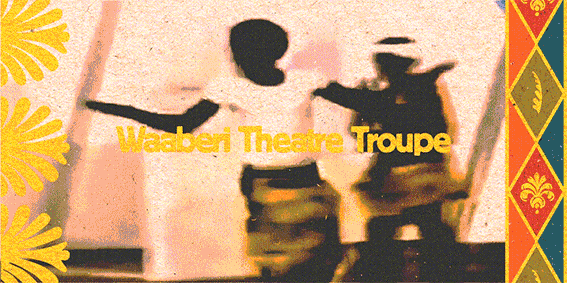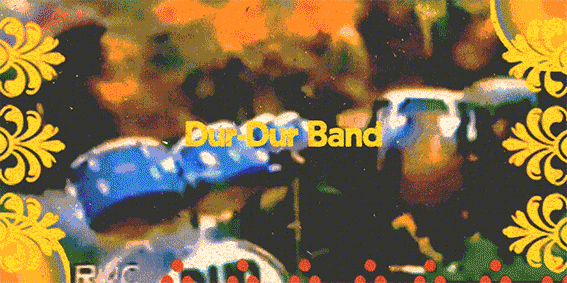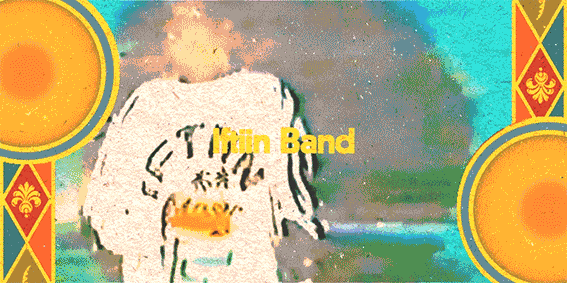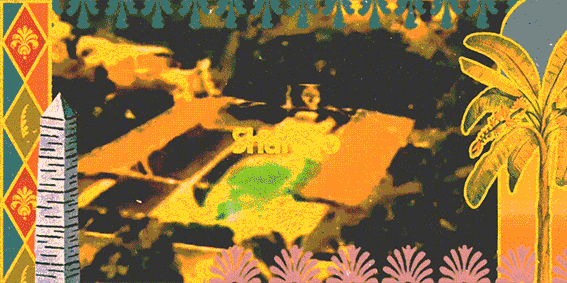
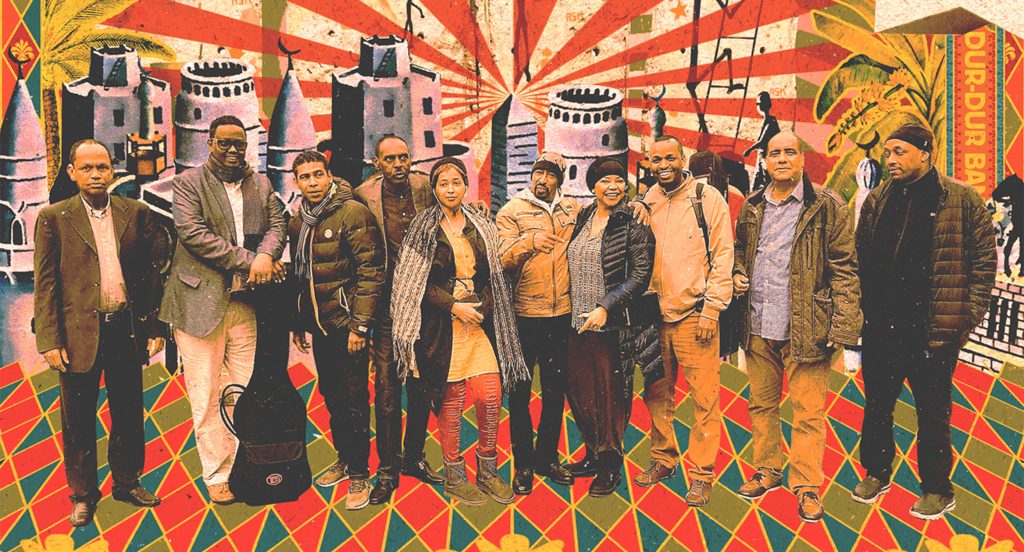

The first studio album of its kind since the golden days of Mogadishu came to a halt three decades ago. Glamorous discos and beachfront stages disappeared as the city was bombed to the ground. Like a sleeping giant patiently awaiting its revival, we can finally hear a new recording by the living representatives of that distinct era so far heard only on reissues. This record captures the historic reunion which took place in 2019 in Germany’s capital. London-based Dur-Dur Band Int. – itself an eight-piece powerhouse of Somali live-music – is backing three legendary singers. Sounding equally Asian as it does African, a definitive proto-Reggae groove channels the titans as they devotedly draw the bridge between the sorrow of all that was lost and the delight of a magic which survived.
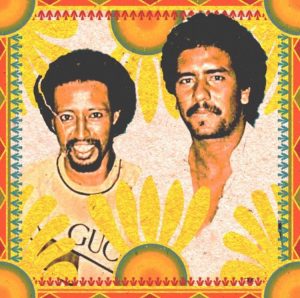
Xabiib Sharaabi (Vox) & Saalax Xariiri (Congas) back in the 80s
Tears are in the eyes of Xabiib Sharaabi, nicknamed the Somali King of Pop. Deprived overnight of both glamour and friends, the war in his homeland had sent him into exile. He found himself stranded and estranged in Sweden. At long last reunited with his musical teammates after thirty solemn years of anonymity, they preview the hall which perfectly resembles Somalia’s national theatre. In three days, Berlin’s HKW will provide the setting for a triumphant comeback. Fueled with a restored sense of pride, the freshly reunited band sets up in a Neukölln loft. Female vocalist Faadumina Hilowle inaugurates the space with an invitation to kickass: “Let’s shake off the dust, boys!” (Inta ka hurguf). These words are destined to become the opening statement of The Berlin Session, the first studio album by a complete Somali ensemble since the golden days of Mogadishu came to a halt three decades ago.
The band lays down a funky groove as she sings a love song immortalized in the 1980s by Faadumina’s late first-cousin – Faadumo Qaasim Hilowle – perhaps the most-recorded voice of Swinging Mogadishu. In the culture of the “Nation of Poets”, vocalists are seen as the interpreters of an inheritance of lyrical pieces. Singing is not a retrograde act of nostalgia, but rather a passionate striving to embody the timeless emotion the poems contain.

Above it all, this album extends the sound of friendship. The songs bubble with the tragic-joy of life’s powerful bonds which have endured to make this spiritual homecoming possible. Transforming like sonic-cuisine, heritage melodies are spiced-up to fuse between the traditional and the reinvented. Three vocalists take turns as chefs, each uncovering another flavour of the band.
Feeling perhaps equally Asian as it does African, this music reflects the broad culture of its homeland. A seafaring passage to the Silk Road, Somalia’s richness had long mirrored the incredible span of its trade – absorbing immigrants and instruments from throughout Southeast Asia, India, Persia, Europe and the Arabian Peninsula.
Grooving with such a strong accent on the off-beat, any non-Somali listener may think of Reggae. But when you ask the musicians, they tell you: “They took it from us! It’s Dhaanto! It’s our rhythm”. Originating from the Ogaden region (now in neighbouring Ethiopia’s borders), Dhaanto dates back to the era of “clap & chant”. Some say it is an imitation of the camel’s bounce.
Choosing to perform his Somali adaptation of “Lady” in the city where Fela Kuti played his infamous concert back in 1978 – vocalist Xabiib has decided to pay a deeply-felt homage to Afrobeat and its empowering heritage. Somalia’s King of Pop, he’d gained his nickname for the body language and magnetising voice with which he incorporated the latest global musical trends – even recording two albums entirely in English. When the decolonializing power of national theatre evolved with the international force of Disco, the soundtrack of the night grew omnipresent.

Back in the 1980s, the wardrobe was flashy and the sound was hot! Long queues of youth lined up along Via Roma to grab one of the bootleg cassettes which echoed in taxis, shops and street corners throughout the country. Mogadishu’s nighttime craze swept the nation. The aviation era had spawned luxurious hotels catering to the booming of safari tourism. Their beach & ballroom stages gave birth to a wild danceable groove. By day, they remained state-employed musicians for Radio Mogadishu and the Waaberi National Theatre group. But with nightfall, private Kooxdas (teams) with changing rosters such as Dur-Dur, Iftiin, Sharero & Somali Jaaz got busy bustin’ loose from the conventional. They were crafting a fresh kind of dance. “It was business, you know. Friday I’d play with one band at Al-Curuba Hotel, Saturday with another at Lido, Sunday yet another at Juba”.
Akin to the Motown Sound of Detroit and Kingston’s Studio One: a small scene of musicians were fueling that new Somali Disco scene. As if a day hadn’t passed, this album finds eight of them laying down the jams for three legendary vocalists. In the heyday of the disco bands, these private outfits were even getting hired to live score in state-run theatres thousands of kilometres away. Frequent flyers on Somali Airlines, they jetted to their recurring appearances in Hargeisa, Kismayo & Djibouti – a young Somali-speaking country on the Horn of Africa and the origin of Cabdinur Allaale, the third vocalist on the album. Himself a leader of Djibouti’s first private group Sharaf Band, he became a true titan of Somali music – having been able to remain on stage for half a century since his first visit to Mogadishu’s national theatre back in 1972, when Cabdinur was already an icon.

By the end of the 1980s, Somalia’s capital (Xamar as the locals call it) was dancing its final dance. The musicians strived to keep it up as the country fell apart, but when the war eventually entered the capital, exile was inevitable. The national theatre was a battleground and the hotels became the backdrops for destruction, many remaining in ruin to this very day.
Dur-Dur Band for example was then active in the 90s in nearby Addis Abeba, yet most of the scene was eventually dispersed over 4 continents. For a decade, Mogadishu’s veteran musicians remained dormant. For Xabiib, the glamour of stardom and Gucci had been replaced with an occasional wedding – singing alongside a backing track. In 2003, a fund-raiser was held in London for the reconstruction of Hargeisa’s National Theater which had been bombed to the ground during the war. Somali singers, actors and comedians from all over the diaspora were invited. A new Kooxda was formed around Dur-Dur’s founding member Abdillahi Cujeeri – calling itself Dur-Dur Band Int. Yet for the last twenty years they’ve been performing mostly within the Somali community.
New listeners have now been prepared by popular reissues of Somali music on labels such as Awesome Tapes From Africa, Analog Africa and Ostinato Records – who’s Grammy-nominated Sweet As Broken Dates already featured Faadumina’s voice as well as Cabdinur’s Sharaf Band in 2017. Some of the legends behind the distinct sound of that acclaimed compilations are luckily still among us, ready to “shake off the dust” in the highest studio fidelity. In 2023, the world is finally ready to appreciate the sound of a group that is no less than a powerhouse of modern Somali music. The band shall live up to its name as the international stage has been suitably set.
For the task of the creation of a cover artwork for such a monumental presentation, the choice of painter Muhyadin Sharafo from Mogadishu is more than legit. Informed by his training in North Korea and East Germany, he is now nearly 90 years old – having been a witness of the rise, the downfall and the renewal.
The Berlin Session travels far beyond the gems collected from dusty cassettes. It is a bridge between the sorrow of all that has been and the delight of a magic which survived, a shining pearl rescued alive from the Atlantean fate of forever drowning in the Indian Ocean.
Text by: Nicolas Sheikholeslami & Omri S. Shmulewitz of Spiritczualic Enhancement Center
– – –
 In 2015 Berlin-based Nicolas “Çaykh” Sheikholeslami was enticed by Somali music. Little did he know that his mixtape Au Revoir, Mogadishu Vol. 1 – Songs From Before The War would end up sparking a massive international interest in Somali music. Soon he was approached by Ostinato Records with the idea to create a legit compilation featuring those sounds. Thus, Sheikholeslami went on to co-curate ‘Sweet As Broken Dates: Lost Somali Tapes from the Horn of Africa’ which received a Grammy nomination in 2018. Berlin’s prestigious HKW took notice and granted him an opportunity to put together a concert with artists from the golden era. Luckily for us, Nicolas sensed the chance for a recording session to be arranged – and that is how we got this album.
In 2015 Berlin-based Nicolas “Çaykh” Sheikholeslami was enticed by Somali music. Little did he know that his mixtape Au Revoir, Mogadishu Vol. 1 – Songs From Before The War would end up sparking a massive international interest in Somali music. Soon he was approached by Ostinato Records with the idea to create a legit compilation featuring those sounds. Thus, Sheikholeslami went on to co-curate ‘Sweet As Broken Dates: Lost Somali Tapes from the Horn of Africa’ which received a Grammy nomination in 2018. Berlin’s prestigious HKW took notice and granted him an opportunity to put together a concert with artists from the golden era. Luckily for us, Nicolas sensed the chance for a recording session to be arranged – and that is how we got this album.
Vocals: Xabiib Sharaabi
Vocals: Cabdinuur Alaale
Vocals: Faadumina Hilowle
Drums: Saciid Xuseen
Congas: Saalax Xariiri
Bass: Cabdillahi Cujeeri
Keys: Yusuf Naaji
Guitar: Nabil Sacaani
Guitar: Cumar Teesiyow
Saxophone: Morton Zakaria
Claves: Akila
Artwork: Muhyadin Sharafo (oil painting) & Ventral is Golden (design)
Recorded: 21.02.2019 & 22.02.2019 Berlin at Butterama Studios in Neukölln by Daniel Nentwig
Producer & Mixing: Nicolas Sheikholeslami
Mastering: Mark Gergis
Executive Producer: Jay Rutledge & Nicolas Sheikholeslami
This project is co-funded by Initiative Musik, the German support office for musicians and music businesses. www.initiative-musik.de/en/
DUR-DUR BAND INT. VIDEO CHANNEL
Dur-Dur Band Int. feat Xabiib Sharaabi – Duurka
Dur-Dur Band Int. feat Cabdinuur Alaale – Heeyaa


